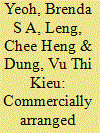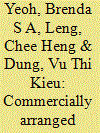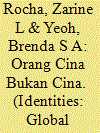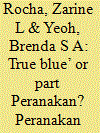|
|
|
Sort Order |
|
|
|
Items / Page
|
|
|
|
|
|
|
| Srl | Item |
| 1 |
ID:
117930


|
|
|
|
|
| Publication |
2013.
|
| Summary/Abstract |
Globalization and increased mobilities have multiplied cross-border transactions not only in the economic sphere but have also a major impact on human relationships of intimacy. This can be seen in the increased volume of differently mediated forms of international marriage, not just straddling 'east' and 'west', but within Asia and across different ethnicities and nationalities. International marriage raises a host of social issues for countries of origin and destination, including challenges relating to the citizenship status and rights of the marriage migrant. This paper examines the negotiation of citizenship rights in the case of commercially matched marriage migrants - namely Vietnamese women who marry Singaporean men and migrate to Singapore as 'foreign brides'. While they are folded into the 'family' - what is often thought of as the basic building block of the nation in Asian societies - they are not necessarily accorded full incorporation into the 'nation' despite Singapore's claims to multiculturalism. This is particularly salient at a point when cross-nationality, cross-ethnicity marriages between Singapore citizens and non-citizens are on the increase, accounting for over a third of marriages registered in Singapore in recent years. Vietnamese women who marry Singaporeans are positioned within the nation-state's citizenship regime as dependents of Singaporean men, having to rely on the legitimacy of the marriage relationship as well as the whims of their husbands in negotiating their rights vis-à-vis the Singapore state. Drawing on interviews and ethnographic work with 20 Vietnamese women who are commercially matched marriage migrants, the paper first focuses on the vulnerable positions these women find themselves, particularly given difficulties in forging their own support networks as well as weaknesses of the civil society sector in what has been called an 'illiberal democracy' characterized by a political culture of 'non-resistance'. The paper then goes on to examine the way they negotiate rights to residency/citizenship, work and children within webs of asymmetrical power relations within the family and the nation-state. We draw on our findings to show that citizenship is 'a terrain of struggle' within a multicultural nation-state shaped by social ideologies of gender, race and class and negotiated on an everyday basis within spheres of family intimacy.
|
|
|
|
|
|
|
|
|
|
|
|
|
|
|
|
| 2 |
ID:
117931


|
|
|
|
|
| Publication |
2013.
|
| Summary/Abstract |
Globalization and increased mobilities have multiplied cross-border transactions not only in the economic sphere but have also a major impact on human relationships of intimacy. This can be seen in the increased volume of differently mediated forms of international marriage, not just straddling 'east' and 'west', but within Asia and across different ethnicities and nationalities. International marriage raises a host of social issues for countries of origin and destination, including challenges relating to the citizenship status and rights of the marriage migrant. This paper examines the negotiation of citizenship rights in the case of commercially matched marriage migrants - namely Vietnamese women who marry Singaporean men and migrate to Singapore as 'foreign brides'. While they are folded into the 'family' - what is often thought of as the basic building block of the nation in Asian societies - they are not necessarily accorded full incorporation into the 'nation' despite Singapore's claims to multiculturalism. This is particularly salient at a point when cross-nationality, cross-ethnicity marriages between Singapore citizens and non-citizens are on the increase, accounting for over a third of marriages registered in Singapore in recent years. Vietnamese women who marry Singaporeans are positioned within the nation-state's citizenship regime as dependents of Singaporean men, having to rely on the legitimacy of the marriage relationship as well as the whims of their husbands in negotiating their rights vis-à-vis the Singapore state. Drawing on interviews and ethnographic work with 20 Vietnamese women who are commercially matched marriage migrants, the paper first focuses on the vulnerable positions these women find themselves, particularly given difficulties in forging their own support networks as well as weaknesses of the civil society sector in what has been called an 'illiberal democracy' characterized by a political culture of 'non-resistance'. The paper then goes on to examine the way they negotiate rights to residency/citizenship, work and children within webs of asymmetrical power relations within the family and the nation-state. We draw on our findings to show that citizenship is 'a terrain of struggle' within a multicultural nation-state shaped by social ideologies of gender, race and class and negotiated on an everyday basis within spheres of family intimacy.
|
|
|
|
|
|
|
|
|
|
|
|
|
|
|
|
| 3 |
ID:
154526


|
|
|
|
|
| Summary/Abstract |
Singapore has one of the tightest regulations over assisted reproductive technologies (ARTs) in Asia, a consequence of Singapore's strong state, the priority it gives to reproduction, and the numerous religious groups in the country and their direct and indirect influence on the Bioethics Advisory Committee, which recommends ART regulations for the country. Together, these key actors give shape to the ‘local moral worlds’, which undergird ART governance in the country. Drawing on in-depth interviews and data from online forums, we illustrate Singaporean fertility seekers' attempts to juggle myriad and sometimes confusing obligations to the state, society and religion in making reproductive choices. We then explore the limits and possibilities for fertility seekers to circumvent the restrictive rules and ‘moral safety valves’ set in place in their home country simply by stepping out to another jurisdiction across national borders. The paper goes on to show how the Internet communities serve as a bridgespace, propelling fertility mobilities by enabling Singaporeans to see creative possibilities in patchwork regulations. At the edges of state and religious power, fertility-seeking subjects take advantage of liminal spaces, grey areas, or permissive regimes to gain several degrees of freedom to practise adaptive fertility strategies that may be ‘unofficial’ but ‘licit’ or ‘socially acceptable’.
|
|
|
|
|
|
|
|
|
|
|
|
|
|
|
|
| 4 |
ID:
110228


|
|
|
|
|
| Publication |
2012.
|
| Summary/Abstract |
In the last two decades, there has been a dramatic rise in international marriages in East and Southeast Asia. A large proportion of these have been between men from wealthier countries and women from poorer countries, many of which are mediated by commercial matchmaking agencies. Agencies that offer men instant marriages with Vietnamese women began to make an appearance in Malaysia in the early 2000s, following closely behind Singapore and Taiwan. In this paper, we use the concepts of objective centrality and social capital to examine three interfaces that marriage brokers in Malaysia have to bridge: the interface with male clients, with access to the supply of potential brides from Vietnam, and with the bureaucratic procedures of immigration and marriage registration. We present one story in greater depth to illustrate the sociability and social capital accumulation process of one Vietnamese bride as she works to establish relationships of trust with her husband and his family. As she makes the transition from marriage migrant to "good wife," she is able to access the social networks of her husband and his family to transform herself into a marriage broker, increasing her own autonomy and access to resources in the process. The surface observation that entering the commercial matchmaking industry does not require much economic capital conceals the considerable amount of social capital that is required.
|
|
|
|
|
|
|
|
|
|
|
|
|
|
|
|
| 5 |
ID:
154517


|
|
|
| 6 |
ID:
155732


|
|
|
|
|
| Summary/Abstract |
In the context of Asia, understanding migration governance needs to transcend statism to encompass the ‘middle space’ of migration. Unlike migration linked to settlement in liberal democratic states of the West, a large part of low-skilled migration in Asia – predominantly circular, feminized, and contractual—is brokered by private recruitment agencies. In adopting migration brokers as a methodological starting point, we make the case for bringing the migration industry into the fold of global migration governance analysis. Based on interviews with employment agencies deploying Indonesian domestic workers to Singapore from 2015 to 2016, we argue that migrant-destination states in Asia devolve responsibility for workers to the migration industry to order migration flows and circumvent formal cooperation with origin countries. Comprehending migration governance in Asia requires grappling with the co-constitutive governance of the state and migration industry and its interdependent dynamics, which we illuminate through the theory of strategic action fields.
|
|
|
|
|
|
|
|
|
|
|
|
|
|
|
|
| 7 |
ID:
110224


|
|
|
|
|
| Publication |
2012.
|
| Summary/Abstract |
This special issue takes the migrant broker as a starting point for investigating contemporary regimes of transnational migration across Asia. The articles, which span large parts of Asia-including China, Indonesia, Laos, Malaysia, Singapore, South Korea, Thailand, Vietnam, as well as New Zealand-show that marriage migration, student migration and various forms of unskilled labour migration, including predominantly male plantation and construction work and female domestic, entertainment and sex work, are all mediated by brokers. Although much is known about why migrants leave home and what happens to them upon arrival, considerably less is known about the forms of infrastructure that condition their mobility. A focus on brokers is one productive way of opening this "black box" of migration research. The articles in this issue are thus not primarily concerned with the experiences of migrants or in mapping migrant networks per se, but rather in considering how mobility is made possible and organized by brokers, most notably in the process of recruitment and documentation. Drawing from this evidence, we argue that in contrast to the social network approach, a focus on the migrant broker offers a critical methodological vantage point from which to consider the shifting logic of contemporary migration across Asia. In particular, paying ethnographic attention to brokers illuminates the broader infrastructure that makes mobility possible while revealing that distinctions between state and market, between formal and informal, and between altruistic and profit-oriented networks are impossible to sustain in practice.
|
|
|
|
|
|
|
|
|
|
|
|
|
|
|
|
| 8 |
ID:
190769


|
|
|
|
|
| Summary/Abstract |
This paper explores how being Peranakan is related to (not) being Chinese in Singapore, intertwining descent, racial categorization, cultural practice and choice. Tracing the complex history of Peranakan identity, it highlights how the social construction of race has created a hybrid yet ethnically Chinese identity, with a rich cultural heritage largely relegated to the past. Drawing on theories of racial formation and the racial state, this study illuminates racial ascription and categorization in Singapore. Interviews with 32 Peranakan individuals highlight the positioning of Peranakan identity within the multiracial framework, subsumed within the Chinese category. Examining the idea of being ‘Orang Cina Bukan Cina/Chinese but not Chinese’, the paper addresses nuances of locating the mixedness of hybridity in a racially structured context. Juxtaposed against the recent revitalization of Peranakan material culture, Peranakan as ‘locally born’ illustrates how this complex identity is used in everyday life by individuals and the state.
|
|
|
|
|
|
|
|
|
|
|
|
|
|
|
|
| 9 |
ID:
187167


|
|
|
|
|
| Summary/Abstract |
While no longer associated with colonial economic and political privilege, Peranakan Chinese identity is now often viewed as an ‘authentic’ heritage in contemporary Singapore that is made visible through hybrid cultural and material markers. But for the Peranakan community, what does it mean to be authentically Peranakan in post-colonial Singapore? This paper explores concepts of hybridity and authenticity for Peranakan individuals, highlighting how being Peranakan is informed by ideas of belonging, mixedness and purity, from being ‘true blue’ to generational shifts towards being part Peranakan. Drawing on critical mixed race theory, the paper provides an historical overview of Peranakan identity in the region, tracing how ‘authentic’ Peranakan-ness has changed over time. Using a series of narrative interviews with self-identified Peranakan individuals across three generations, the paper explores public and private representations of identity, and how mixedness and purity are seen as being ‘authentic’ aspects of Peranakan culture.
|
|
|
|
|
|
|
|
|
|
|
|
|
|
|
|
|
|
|
|
|